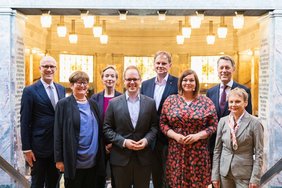The war in Ukraine has recently shown that geopolitical changes and international crisis fundamentally affect global science systems, actions at universities and research institutions as well as science policy. Thus, the University of Hamburg has started a new conference format called Hamburg Forum for Global Science and Policy. The aim of this strategy conference series is to widen the focus and to discuss mid- and long-term aspects of science systems in times of complex crises and within the context of a possible new systemic competition. Moreover, the new forum wants to make a discernible contribution to future discussions on science and higher education policy at an international level.
The first event of the Hamburg Forum for Global Science and Policy dealt with the impact of complex crisis on global academic systems and took place at the MARKK - Museum am Rothenbaum on Monday, 4th July 2022. Dr Jens Brandenburg, Parliamentary State Secretary to the Federal Minister of Education and Research, Katharina Fegebank, Second Mayor of the Free and Hanseatic City of Hamburg and Senator for Science, Research, Equality and Districts, Prof. Dr Dr Sabine Kunst, Chairwoman of the Board of the Joachim Herz Foundation, Prof. Dr Ursula Schröder, Director of the Institute for Peace Research and Security Policy at the University of Hamburg and Dr Georg Schütte, Secretary General of the Volkswagen Foundation participated in the discussion. Besides, representatives from universities, scientific institutions, foundations and politics joined the event. The discussion was moderated by Prof. Manuel Hartung, Chairman of the ZEIT foundation.
The participants debated the following topics: What is the purpose of international cooperation? Under what conditions should international cooperation be terminated? Are sanctions only successful when science is involved and how does that reconcile with the principles of scientific freedom? What systems of knowledge and what interdisciplinary and cross-border cooperation are eligible for taking a multi-perspective view on the interdependencies of current crisis, e.g. conflicts, global raw material shortages and energy crisis or the consequences of the climate change? What professional expertise and risk management will be needed at universities? What kind of knowledge do we have to bring together? What are the consequences and requirements regarding the structures and priorities of science policy and research funding?
Univ.-Prof. Dr Hauke Heekeren, President of the University of Hamburg: „The war of aggression in Ukraine and its impact on international cooperation confronts us with fundamental questions of academic cooperation in particular with countries that do not share our liberal and democratic principles. As a university, it is our duty to create and open up spaces for discussion and exchange where these issues can be debated in a science-based framework: Therefore, we will invite experts, academic institutions, political decisions-makers, and social actors to get together and to reflect and debate the global challenges of our time and find solutions. Science can and wants to be not only a sparring partner but also a driving force when shaping informed decisions in politics and society.”
The event was hosted by the University of Hamburg in cooperation with the Institute for Peace Research and Security Policy at the University of Hamburg (IFSH) and the Hamburg Institute for Advanced Study (HIAS). The Hamburg Forum for Global Science and Policy is an international strategy conference of the University of Hamburg and is financed through funds from the Excellence Strategy of the Federal and State Governments.
The picture shows the participants of the opening event (f.l.t.r.): Prof. Manuel Hartung, Chairman of the ZEIT foundation (moderation), Dr Dorothea Rüland, Secretary General Hamburg Institute for Advanced Study, Prof. Ursula Schröder, Director of the Institute for Peace Research and Security Policy at the University of Hamburg, Dr Jens Brandenburg, Parliamentary State Secretary to the Federal Minister of Education and Research, Prof. Dr Hauke Heekeren, President of the University of Hamburg, Katharina Fegebank, Second Mayor of the Free and Hanseatic City of Hamburg and Senator for Science, Research, Equality and Districts, Dr Georg Schütte, Secretary General of the Volkswagen Foundation and Prof. Dr Sabine Kunst, Chairwomen of the Board, Herz Foundation.
